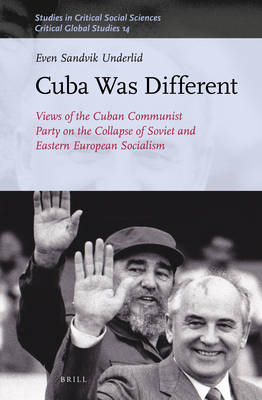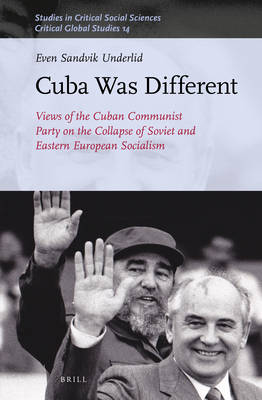
- Afhalen na 1 uur in een winkel met voorraad
- Gratis thuislevering in België vanaf € 30
- Ruim aanbod met 7 miljoen producten
- Afhalen na 1 uur in een winkel met voorraad
- Gratis thuislevering in België vanaf € 30
- Ruim aanbod met 7 miljoen producten
Zoeken
Cuba Was Different
Views of the Cuban Communist Party on the Collapse of Soviet and Eastern European Socialism
Even Sandvik Underlid
€ 427,45
+ 854 punten
Uitvoering
Omschrijving
In Cuba Was Different, Even Sandvik Underlid explores the views of Cuban authorities, official press, and Party members as they reflect back on the collapse of Soviet and Eastern European socialism. In so doing, he contributes to a better understanding as to why the Cuban system - often associated with Fidel Castro's leadership - did not itself collapse. Despite the loss of its most important allies, key ideological referents, and even most of its foreign trade, Cuba did not embrace capitalism.
The author critically examines and analyzes the collapse of the USSR and Eastern Europe as reported in the Cuban Communist Party newspaper Granma, both as they unfolded and subsequently through the lens of additional interviews with individual Party members. This focus on Cuba's Communist Party provides new perspectives on how these events were seen from Cuba and on the notable resilience of many party members.
The author critically examines and analyzes the collapse of the USSR and Eastern Europe as reported in the Cuban Communist Party newspaper Granma, both as they unfolded and subsequently through the lens of additional interviews with individual Party members. This focus on Cuba's Communist Party provides new perspectives on how these events were seen from Cuba and on the notable resilience of many party members.
Specificaties
Betrokkenen
- Auteur(s):
- Uitgeverij:
Inhoud
- Aantal bladzijden:
- 392
- Taal:
- Engels
- Reeks:
- Reeksnummer:
- nr. 177
Eigenschappen
- Productcode (EAN):
- 9789004442887
- Verschijningsdatum:
- 25/02/2021
- Uitvoering:
- Hardcover
- Formaat:
- Genaaid
- Afmetingen:
- 155 mm x 235 mm
- Gewicht:
- 774 g

Alleen bij Standaard Boekhandel
+ 854 punten op je klantenkaart van Standaard Boekhandel
Beoordelingen
We publiceren alleen reviews die voldoen aan de voorwaarden voor reviews. Bekijk onze voorwaarden voor reviews.











